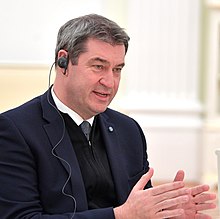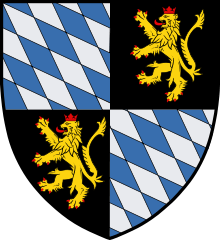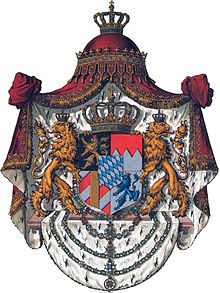Bavarian Prime Minister
The Bavarian Prime Minister , according to the fourth section of the first main part of the Constitution of Bavaria , the chairman of the Bavarian state government .
Markus Söder ( CSU ) has been Prime Minister of the Free State of Bavaria since March 16, 2018 . He is the successor to Horst Seehofer ( CSU ), who has moved to the Merkel IV cabinet as Federal Minister of the Interior, for Building and Home Affairs .
Election and resignation
The Minister-President is secretly appointed by the Bavarian State Parliament , which meets at the latest 22 days after its election (this period has been in effect since the referendum of September 21, 2003) within a week of its constituent meeting for a period of five years with an absolute majority of the votes cast Vote elected. If none of the applicants achieves this majority in the 1st ballot, there will be a runoff between the two applicants who received the most votes. In the event that the runoff ballot in two rounds leads to a ballot between these two applicants, Section 45 (2) sentence 2 of the Rules of Procedure of the Bavarian State Parliament provides for a drawing of lots. Every Bavarian who is eligible to vote is eligible as long as he has reached the age of 40. The state parliament cannot remove the prime minister from office. The constitution stipulates his resignation, however, if a trusting cooperation with the state parliament is no longer possible due to political circumstances (Art. 44 Para. 3 Bavarian Constitution ). If he doesn't, he can be charged before the Bavarian Constitutional Court .
tasks
The prime minister directs the affairs of the state government. With the consent of the Landtag, he appoints and dismisses his deputy and a maximum of 17 ministers of state and state secretaries to whom he assigns business areas or special tasks. According to Article 50 of the state constitution, the Prime Minister can take over one or more business areas himself. He is responsible for the political guidelines and represents Bavaria externally. In his actions he is responsible to the state parliament. The Prime Minister can make use of a right to pardon .
The Bavarian State Chancellery supports the Prime Minister in his constitutional tasks .
History of office
The forerunner of the office of the Prime Minister was the Secret Council Chancellor of the Electorate of Bavaria . From the end of the 18th century, the Minister of Foreign Affairs , from 1806 Minister of the Royal House and Foreign Affairs , usually assumed a prominent position. In 1847 a Council of Ministers was established, but King Ludwig I (1825–1848) reserved the chair for himself; in his absence the most senior minister presided over the meetings. In 1849 the office of chairman of the Council of Ministers was created, which with one exception (1880-1890) was connected to the office of Foreign Minister until the end of the kingdom . With the establishment of the Free State on November 8, 1918 in the course of the November Revolution at the end of the First World War , the office of Prime Minister was also created; the first incumbent on a revolutionary basis was Kurt Eisner . During the Nazi regime the office between 1933 and 1945 lost due to the DC circuit of the countries in importance.
The American military government appointed Fritz Schäffer as "Temporary Minister-President for Bavaria" on May 28, 1945 ; on September 28, 1945 she deposed him and appointed Wilhelm Hoegner (SPD) as his successor. After the state elections on December 1, 1946 , the state parliament elected Hans Ehard (CSU) as Prime Minister (the first freely elected after the war). Ehard held two full legislative terms ( Cabinet Ehard I , II and III ).
Public officials
Secret Council Chancellor
| Official | Term of office | Remarks |
|---|---|---|
| Johann Adlzreiter from Tettenweis | 1650-1662 | |
| Johann Georg Oexle | 1662-1667 | |
| Kaspar von Schmid | 1667-1693 | |
| Johann Rudolf von Wämpl | 1695-1704 | |
| vacant | 1704-1726 | Imperial administration in Bavaria 1704–1714 |
| Franz Xaver Josef Freiherr von Unertl | March 3, 1726 - March 6, 1749 |
|
| Franz Xaver Andreas von Praidlohn | 1749-1758 | |
| Wiguläus Freiherr von Kreittmayr | September 20, 1758 - October 21, 1790 |
|
| Johann Friedrich von Hertling | 1790-1806 |
Foreign Minister
Before 1849 there was no prime minister, but the Minister of Foreign Affairs, from 1806 Minister of the Royal House and Foreign Affairs , usually had a priority. In 1847 a Council of Ministers was established, but King Ludwig I (1825–1848) reserved the chair for himself; in his absence the most senior minister presided over the meetings.
| minister | Term of office | Remarks |
|---|---|---|
| Maximilian Franz Joseph Freiherr and Count von Berchem | 1745 - November 18, 1777 |
Foreign Minister |
| Matthäus Graf von Vieregg | November 18, 1777 - February 21, 1799 |
Foreign Minister |
| Maximilian Joseph Count of Montgelas | February 21, 1799 - February 2, 1817 |
Foreign Minister, at times also Finance and Interior Minister |
| Heinrich Alois von Reigersberg | February 2, 1817-1823 |
Chairman of the Council of Ministers , |
| Aloys Graf von Rechberg and Rothenlöwen | February 2, 1817 - October 1825 |
Foreign Minister, Chairman of the Council of Ministers from 1823 |
| Friedrich Karl Freiherr von Thürheim | January 1, 1827-1828 |
Minister of Foreign Affairs, on leave from April 22, 1827 |
| Georg Friedrich Freiherr von Zentner | April 22, 1827 - September 1, 1828 |
Minister of Foreign Affairs |
| Joseph Ludwig Count of Armansperg | September 1, 1828 - 1831 |
Foreign Minister, also Minister of Finance |
| Friedrich August Freiherr von Gise | 1831 - May 26, 1846 |
Minister for Foreign Affairs until January 2, 1832 |
| Otto Graf von Bray-Steinburg | May 26, 1846 - February 13, 1847 |
Minister for Foreign Affairs until January 1, 1847 |
| Georg Ludwig von Maurer | March 1 - November 29, 1847 |
"Ministry of Dawn", Minister Administrator for Foreign Affairs and Justice |
| Ludwig Prince of Oettingen-Wallerstein | December 1, 1847 - March 12, 1848 |
" Lola Ministry ", Minister Administrator of Foreign Affairs and Cult |
| Klemens August Graf von Waldkirch | March 14, 1848 - April 29, 1848 |
“March Ministry”, ministerial administrator for foreign affairs |
| Otto Graf von Bray-Steinburg | April 29, 1848 - April 18, 1849 |
Foreign Minister |
Chair of the Council of Ministers
In 1849 the office of chairman of the Council of Ministers was created, which with one exception (1880–1890) was connected to the office of Foreign Minister.
| Official | Term of office | Remarks |
|---|---|---|
| Ludwig Karl Heinrich Freiherr von der Pfordten | December 22, 1849 - May 1, 1859 |
also foreign minister independent |
| Karl Freiherr von Schrenck von Notzing | May 1, 1859 - October 4, 1864 |
also foreign minister independent |
| Max Ritter von Neumayr | October 4, 1864 - December 4, 1864 (provisional) |
also Minister of the Interior (1859–1865); Acting Foreign Minister independent |
| Ludwig Karl Heinrich Freiherr von der Pfordten | December 4, 1864 - December 29, 1866 |
also foreign minister independent |
| Prince Clovis of Hohenlohe-Schillingsfürst | December 31, 1866 - March 7, 1870 |
Foreign Minister also independent ( National Liberal ) |
| Otto Graf von Bray-Steinburg | March 8, 1870 - June 25, 1871 |
also foreign minister |
| Friedrich Freiherr von Hegnenberg-Dux | August 21, 1871 - June 2, 1872 |
Foreign Minister also independent (National Liberal) |
| Adolph von Pfretzschner | October 1, 1872 - March 4, 1880 |
Foreign Minister also independent ( Liberal ) |
|
Johann von Lutz (from 1884 baron) |
March 4, 1880 - June 1, 1890 |
also minister of culture independent (national liberal) |
| Friedrich Krafft, Count of Crailsheim | June 1, 1890 - March 1, 1903 |
Foreign Minister also independent (National Liberal) |
|
Clemens Freiherr von Podewils-Dürnitz (count from 1911) |
March 1, 1903 - February 9, 1912 |
Foreign Minister also independent (National Liberal) |
|
Georg Friedrich Freiherr von Hertling (count from 1914) |
February 9, 1912 - November 10, 1917 |
also Foreign Minister Center |
| Otto Ritter von Dandl | November 11, 1917 - November 7, 1918 |
also foreign minister independent |
Prime ministers and exceptional bodies of the Free State of Bavaria
| Official | Term of office | Remarks |
|---|---|---|
| Kurt Eisner | November 8, 1918 - February 21, 1919 |
USPD |
| Johannes Hoffmann | March 17, 1919 - March 14, 1920 |
SPD |
| Gustav Ritter von Kahr | March 16, 1920 - September 11, 1921 |
non-party (national conservative) |
| Hugo Graf von und zu Lerchenfeld on Köfering and Schönberg | September 21, 1921 - November 2, 1922 |
BVP |
| Eugen Ritter von Knilling | November 8, 1922 - June 30, 1924 |
BVP |
| Gustav Ritter von Kahr | State Commissioner September 25, 1923 - February 17, 1924 |
Non-party (national conservative) The General State Commissioner was given executive power by the entire Ministry based on Article 64 of the Bamberg Constitution as an exceptional body . |
| Heinrich Held | July 2, 1924 - March 9, 1933 |
BVP has only been executive since the summer of 1930 due to lack of a parliamentary majority |
| Franz Ritter von Epp |
Reich Commissioner March 9 - April 12, 1933 Governor April 10, 1933 - April 28, 1945 |
NSDAP as Reich Commissioner, exercising the powers of the Prime Minister, then as Reich Governor according to the Reich Governor Act, formally the highest state authority and supervisory body of the Reich Chancellor |
| Ludwig Siebert | April 12, 1933 - November 1, 1942 |
NSDAP |
| Paul Giesler | November 2, 1942 - April 28, 1945 |
NSDAP |
| Fritz Schäffer | May 28, 1945 - September 28, 1945 |
non-party (formerly BVP , later CSU ) |
| Wilhelm Hoegner | September 28, 1945 - December 16, 1946 |
SPD |
| Hans Ehard | December 21, 1946 - December 14, 1954 |
CSU |
| Wilhelm Hoegner | December 14, 1954 - October 8, 1957 |
SPD |
| Hanns Seidel | October 16, 1957 - January 22, 1960 |
CSU |
| Hans Ehard | January 26, 1960 - December 11, 1962 |
CSU |
| Alfons Goppel | December 11, 1962 - November 6, 1978 |
CSU |
| Franz Josef Strauss | November 6, 1978 - October 3, 1988 |
CSU |
| Max Streibl | October 19, 1988 - May 27, 1993 |
CSU |
| Edmund Stoiber | May 28, 1993 - September 30, 2007 |
CSU |
| Günther Beckstein | October 9, 2007 - October 27, 2008 |
CSU |
| Horst Seehofer | October 27, 2008 - March 13, 2018 |
CSU |
| Markus Söder | March 16, 2018 - |
CSU |
covers
Although the Prime Minister is not a civil servant , his remuneration is linked to the civil servant's pay. According to Article 10 of the Bavarian Ministerial Law, he receives 32/25 of the basic salary of grade B 11; this is currently (as of 2020) 18,155.32 euros per month. In addition, there are family allowances, allowances and allowances in the corresponding application of civil service law, as well as a service expense allowance of 1150 euros per month.
See also
- Political system of Bavaria
- History of Bavaria
- Bavarian State Government
- Prime Minister of the federal states
- List of the state election results in Bavaria
- current state government
- List of US military governors of Bavaria
Web links
- Prime Minister of the Free State of Bavaria
- The Prime Ministers of the Free State of Bavaria since 1945 Kolja Bartsch, Scientific Service of the German Bundestag, No. 03/07, January 26, 2007 (pdf 93 kB)
Individual evidence
- ↑ Rules of Procedure for the Bavarian State Parliament. (PDF) July 17, 2008, accessed March 8, 2018 .
- ↑ www.bayern.de: CV
- ↑ www.bayern.de: CV
- ↑ https://www.gesetze-bayern.de/Content/Document/BayStaatsRRVG/true?AspxAutoDetectCookieSupport=1





